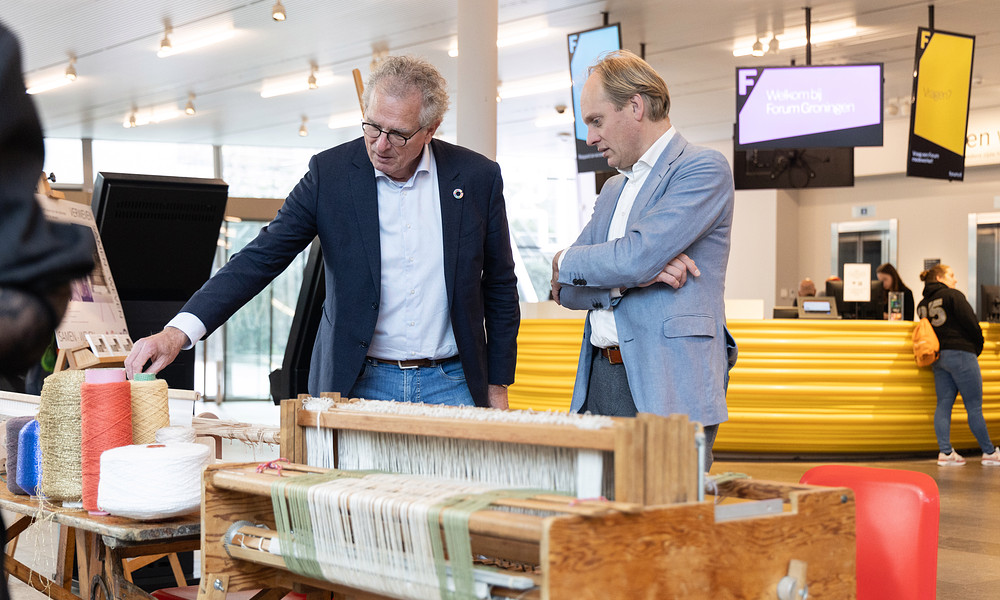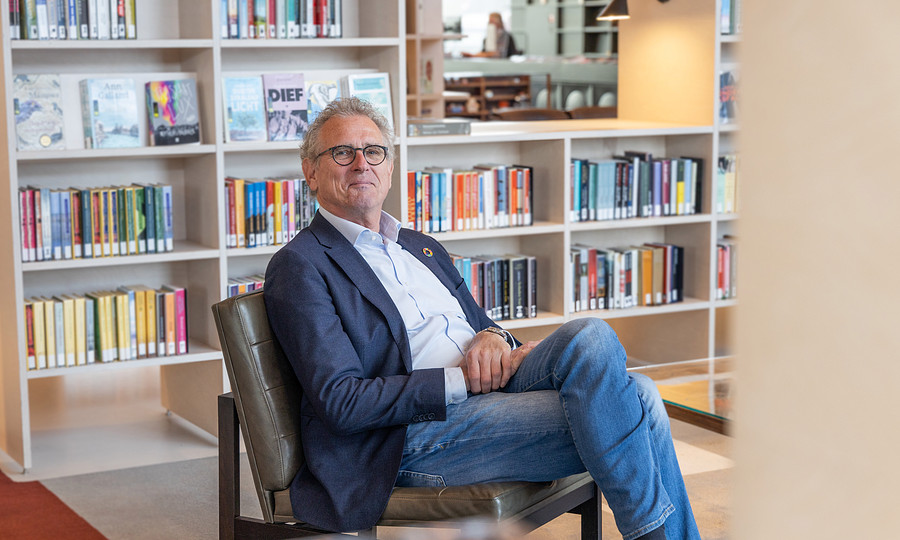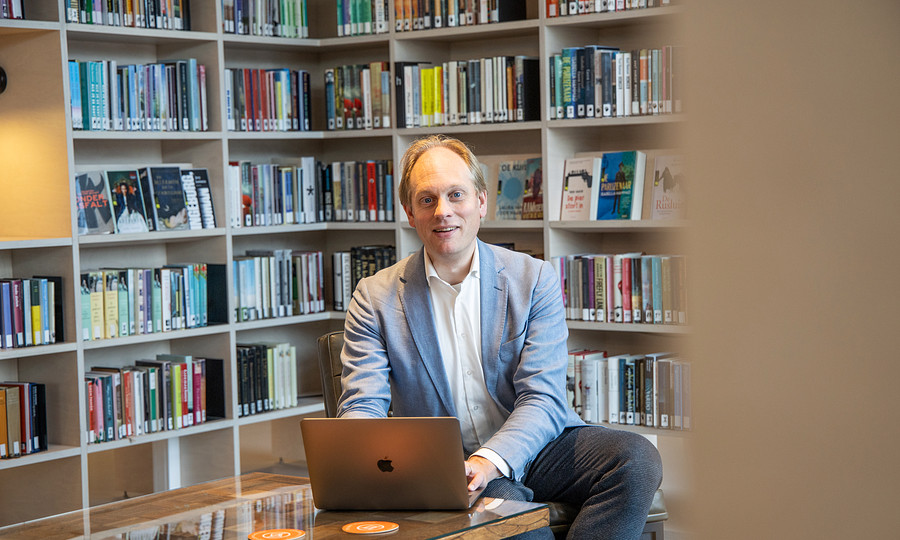Two professors, one mission: collaboration for a sustainable society
- Research stories

Egbert Dommerholt and Niels Faber have something in common. Not only do they share an interest in sustainability and a transition to a fair economy, they also share the same job title: Professor Biobased Business Valorization. That’s because Egbert will soon be retiring; he will say goodbye to the Hanze in the spring of 2024. Niels has been appointed as his successor, allowing the two to work together on their shared interests until Egbert’s departure.
The professorship Biobased Business Valorization is a tricky name, and to most, it might not be immediately clear what it entails. “It’s more accurate to say it’s about the circular economy,” says Egbert. “…and beyond, in fact. We want to move past a circular economy, to a system that’s truly fair and sustainable.” Niels agrees, and adds to this point: “It’s a stop along the route to a performance economy. The real question should be: what is value? What does our economy value, and what should it value instead?”
This question of value comes at a critical time. A time when value is still predominantly interpreted as profits and GDP growth – this fixation has caused a situation where our carbon emissions are through the roof and our vital resources are quickly running out. It’s a situation that both Niels and Egbert are all too aware of. Egbert: “It’s madness to think that infinite growth is possible on a finite planet.” In his years as a professor at the Research Centre Biobased Economy, Egbert has spent a significant amount of time exploring the concept of degrowth. Degrowth is a movement that denounces GDP as a measure of human and economic development, and aims to reduce production in industries that put pressure on our natural world and are not conducive to human welfare.
“I can sell degrowth to students with ease,” says Egbert. “They understand that you can’t put the brakes on emissions, and pump the gas on production at the same time. It’s more difficult with older generations. They are stuck in their systems, their traditional ways of thinking.”
“Degrowth touches a nerve,” agrees Niels. “But maybe it’s more interesting to ask what growth is. GDP is one measure of growth, sure, but ask an entrepreneur and they will tell you about qualitative growth.”
“Unfortunately, I’m an economist,” says Egbert. “And an economist’s definition is black and white.”

It’s madness to think that infinite growth is possible on a finite planet.
Egbert and Niels may have their nuances around definitions of growth and value, but one thing is clear: the transition to a more sustainable economy is urgent. “We are running out of stuff,” says Egbert. “Our raw materials are depleting rapidly, and this applies to biobased materials too. We’re living in a single-use economy.”
It’s easy to point the finger at the consumer. We have lost touch with our belongings, the objects we should take care of and treasure. We don’t know where they came from, how they were made, or how to fix them. Many consumers try to make more sustainable choices when they shop. “It’s difficult just to focus on consumption, because most products have a very long production line. The objects you buy now, such as electronics, were designed and produced a long time ago. Many would say every purchase is a vote, but the market isn’t as straightforward as you’d think.” Though this complicates things, Niels says this actually highlights importance of laws and regulations in industry and sustainable production.
Although the problem is complex, one thing is certain: our current consumption, especially in Western countries, cannot be sustained. Not just because of our planetary boundaries, but also because of the human suffering it causes. The standard of living we have come to expect means people in other countries (predominantly the Global South) need to live with the repercussions, such as forced or low paid labour, polluting production practices, and extreme weather. Egbert: “To achieve the welfare 17 million people in the Netherlands enjoy, we require 14 million people somewhere else in the world to suffer.” [Source: Hoe Handel Ik Eerlijk by Matthias Olthaar and Paul Schenderling]
“And is that welfare true happiness?” ask Niels in response. “Are we truly happy in a society riddled with pressure to perform, to produce, and unhealthy lifestyles?”
Niels adds that before, questions around sustainability focused on the technological aspect. “Now, people in economic and business sectors are asking themselves: ‘what role do we play in the sustainability transition’? And it’s our task to answer that question. Our educational system needs to catch up.” Egbert agrees: “The future of companies is intertwined with the future of our students – what kind of students do we need? What values do we want future employees to have?” Niels expects that the next generation will surprise us: “I’m seeing that students ascribe less value to money, and more value to meaningful work.”

I’m seeing that students ascribe less value to money, and more value to meaningful work.
As a professor, you want to create impact. You want your research to make a difference to society, whether that’s for students, businesses, the general public, or politics. “Over the last three years, I’ve focused on getting the message out there. And I get the feeling the message is beginning to land,” Egbert says. Impact often starts with awareness, especially when awareness can lead to behavioural change.
Another way to achieve impact is collaboration and network building. Niels has contributed to Egbert’s research projects in his role as a researcher during these three years of his professorship. One of these projects is Noord-Nederland verdient circulair (Northern Netherlands deserves circular). In this project, the aim was to find out how companies and organisations can be brought together to cooperate in a circular ecosystem. “The foundation of a circular economy is cooperation. It can’t be achieved by a single company, it requires working together throughout the chain. This means we need to reevaluate our economic system. Currently, what we have is a competition economy. This does not blend well with a circular economy. Sure, a market-driven economy has brough us many great things, but we’re now experiencing its dark sides.”
Egbert recognises this: “If you compare the definition of a market-driven economy with the definition of warfare, there are many parallels. They use the same jargon.” Niels adds a philosophical touch: “The most beautiful things humanity has achieved, have been throughout cooperation. Not competition.”
How satisfied are you with the information on this page?